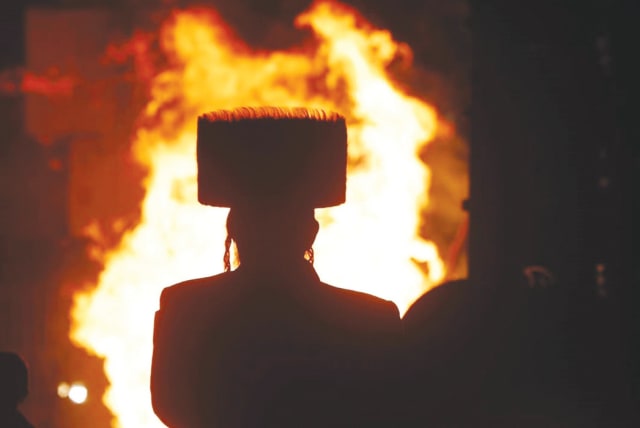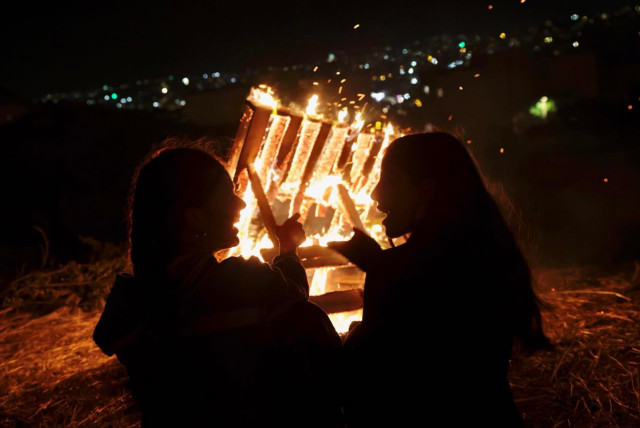Lag Ba’Omer is a beacon of unity amid the trials of our time - opinion

We must draw inspiration from Lag Ba’Omer, a day that signifies the end of internal strife, to renew our commitment to unity and collective strength.
We have just marked Lag Ba’Omer. This symbolic day is more than a break in a solemn period of the Jewish tradition of counting the Omer.
It is a powerful reminder of the importance of Jewish values of tolerance and unity.
Historically, the day marks the end of a horrible plague that killed 24,000 of Rabbi Akiva’s students. We learn that they were punished for a lack of civility in their debates and discourses.
They perished due to baseless hatred, and their deaths are a reminder of the destructive power of division. However, the cessation of their plague is also a glaring reminder that there is always the possibility of starting over and doing better. It is a testament to the possibility of healing and renewal.
This year, the Lag Ba’Omer bonfires have illuminated a nation transformed by recent trials. This significant date in the Jewish calendar comes at a time when celebrations of any kind are terribly complex.
The joy and warmth of Lag Ba’Omer stand in stark contrast to the pain and sorrow of the past months. The atrocities of October 7, the ensuing war, and the profound shifts within Israeli society have reshaped our collective consciousness. Yet, within the ongoing suffering, an intense public conversation on unity has emerged.
In the aftermath of October 7, we have witnessed both the worst and the best of humanity. The horrors of that day are indelibly etched in our minds, a painful reminder of the threats we face.
But in our response, we have also seen extraordinary acts of courage, compassion, and solidarity. Israelis across the country have come together, transcending differences to support one another.
Religious, secular, young, old, residents of the geographic center and those from the periphery – every community has been represented in the civilian effort to maintain the home front.
Each one has contributed according to their means, whether they be physical or spiritual. Through all of it, we have forged a new Jewish unity, a shift from last year when it felt as though our country would be ripped apart due to our differences.
All of this echoes the traditional reasons we have to mark Lag Ba’Omer.
The strength of Jewish unity during the war may just be strongest in how our nation has embraced the families of the hostages. It’s been my honor to be part of those efforts, and to connect their families to people from the ultra-Orthodox community in Israel they might otherwise never befriend.
Our solidarity and moments of prayer demonstrate the profound impact of unity during these challenging times.
It is worth noting how families awaiting the return of hostages have found solace in mirroring the ancient Jewish tradition of counting.
Embedded into our rituals, Jews count the days of the week, the days of the Omer, and, of course, now, the days until their loved ones, our brothers and sisters, come home.
Counting is a daily ritual symbolizing anticipation for the day of redemption. It encourages us to come together while we wait for our hope to materialize.
AT THE same time, we must also acknowledge the emerging divisions withi our society, threatening our unity.
The pressures of war, differing political views, and the varied impacts on different communities have started to drive new wedges between us. It is crucial that we address these fractures with the same determination that has seen us through recent trials.
Just as Rabbi Akiva taught us the importance of “loving your neighbor as yourself,” we must strive to bridge our differences and foster a society based on mutual respect and understanding.
Sustainable and deep Jewish unity can be fostered by investing in radical efforts. To start, we each must go out and meet a singular Jew with whom we would never connect.
I have witnessed ultra-Orthodox and secular Jews intentionally gather and learn about one another. The outcomes have, more often than not, been the foundation of lasting friendships.
Over the last seven months, I’ve seen those relationships become pillars for Israeli soldiers who have ma de the time during their days out of the army to reconnect with their ultra-Orthodox friends, from whom they rely for spiritual fortitude.
By deliberately seeking to talk and listen to the “other,” we can ultimately transform Israeli society to be more unity and full of empathy.
We must draw inspiration from Lag Ba’Omer, a day that signifies the end of internal strife, to renew our commitment to unity and collective strength. In medieval times, the move from fighting to unity was a matter of life and death.
Today, our security and lives once again depend on the strength derived from our unity.
The writer is the founder and CEO of Kesher Yehudi.
Jerusalem Post Store
`; document.getElementById("linkPremium").innerHTML = cont; var divWithLink = document.getElementById("premium-link"); if (divWithLink !== null && divWithLink !== 'undefined') { divWithLink.style.border = "solid 1px #cb0f3e"; divWithLink.style.textAlign = "center"; divWithLink.style.marginBottom = "15px"; divWithLink.style.marginTop = "15px"; divWithLink.style.width = "100%"; divWithLink.style.backgroundColor = "#122952"; divWithLink.style.color = "#ffffff"; divWithLink.style.lineHeight = "1.5"; } } (function (v, i) { });

